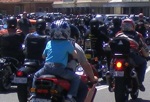
With an appeal pending in the High Court from the SA Government because of the over-turning of part of its ‘bikie’ legislation, similar laws are largely on hold Australia-wide. In WA, motorcycle groups are getting active ahead of a likely mid-year introduction of anti-association laws to the WA Parliament.
(Photo: Club rally, Fremantle, Feb 2010: photo by JR)
Bikies rally to fight legislation
West Australian motorcycle clubs called members and supporters together last month to fight proposed legislation under which the WA Government would turn selected individuals into criminal pariahs, without charge or conviction.
On Saturday 13 February 2010, a protest ride in Fremantle, organized by the United Motorcycle Council of Western Australia which represents a dozen clubs, demonstrated opposition to the laws, set to be introduced to the WA Parliament mid-year.
The anti-association laws are expected to dictate who a person or group could talk to, where they could converse, and how frequently. They are not likely to specifically name bikies, and so could be applied to any group.
The rally involved a range of clubs, motorcyclists’ families and several generations of bikers from all walks of life blending harmoniously in a bid to highlight what they described as the absurdity of “radical and reactionary proposals”.
UMCWA spokesperson, Peter Godfree, said the laws unfairly targeted bikers and would alienate motorcyclists and club members from the rest of the community. Already, negative stereotyping of so-called “outlaw” bikies was stigmatizing council members’ children at school and impacting adversely on members’ businesses.
“UMCs in every state believe it is an issue that is not just for their state, but an issue all Australians need to be aware of, so we decided to band together to fight the laws,” Mr Godfree said. “We have a lot of public support in this state and obviously in other states as well.
“It’s not just unconstitutional…it’s downright un-Australian.”
Mr Godfree said that the Attorney General, Christian Porter, and other members of the WA Government had chosen not to consult with or inform the Council about the planned laws in advance.
He said he hoped the protests would “open the eyes of average Australians” so they would know “the laws are not right, not fair and don’t just attack us, they affect everybody”.
The group are prepared to take their battle as far as the High Court if necessary, he said, questioning the credibility of government assertions the laws will take aim at only the “half a percent of the population” that comprise “outlaw clubs”.
“Even if they got rid of bikies, these laws would stay in place and be used to attack other minorities,” Mr Godfree said.
“They’re using us as a platform for laws, like seizure of assets laws and stop-and -search laws, which they said they would use on the bikies and the Mr Bigs of the drug trade, but you’ll find that they’re using them on the general public.”
Last year Mr Porter said he would defer drafting the bill to observe hiccups in the anti-bikie legislation of NSW and South Australia.
SA’s Supreme Court has overturned the SA legislation, quashing one charge on a point of judicial principle. The basis for the decision was that the A-G was making decisions to ban clubs and people on secret “information”, not evidence, provided by the SA Police Commissioner. While such an administrative decision was, under the legislation, a legal process, it was not legal if the information/decision remained secret so that it could not be reviewed by a court.
The SA Government is appealing the Supreme Court ruling to the High Court of Australia. All States and Territories are awaiting the High Court ruling.
Anti-association laws can brand individuals as criminals without a conventional conviction. Anyone subject to an anti-association order is restricted as to whom they can speak with, how frequently, and where. It works in reverse also: ordinary people are stopped from conversing with branded individuals.
As Mr Godfree pointed out, banning one person can often impact on children and workmates.
“We have a perfectly good judicial system and it should be left to the courts to decide who is a criminal and who isn’t,” Mr Godfree said.
A report from the Australian Institute of Criminology to the August 2009 federal parliamentary inquiry showed ‘anti-bikie’ fortification laws introduced to the WA Parliament in 2001 to combat the “sinister and complex activities of criminal gangs”, had rarely been used.
In 2008, after legal challenges, the High Court upheld the WA Police Commissioner’s right to seek warrants under organized crime anti-fortification provisions contained in the Corruption and Crime Commission Act, but the report also indicated that since 2004, no warrants had been sought.
A spokesperson for the CCC last month said the latest figures, from the 2008-09 Annual Report, confirmed no anti-fortification warrants had been issued.
In relation to the WA legislation, Mr Porter said late in February that: “The recent protests by the UMCWA have not fazed the Government. Introducing the organised crime legislation is a priority for the State Government. The legislation will target groups who meet together for the purposes of planning, organising or engaging in criminal activity. If these groups are not involved in organised crime they have nothing to worry about.”
By Liz Murray, who is an Australian freelance researcher and journalist writing on civil liberties, human rights and crime matters (Photo by JR).
POSTSCRIPT: It is expected that the ‘bikie’ laws will form the basis of a complaint to the UN Human Rights Council when it reviews Australia’s compliance in 2011.

